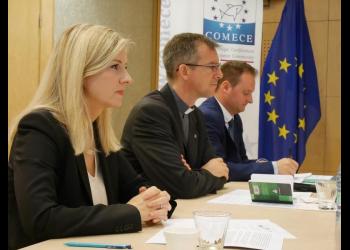Fostering resilience by drawing on religious insights and networks
The Brussels Office of the Bahá'í International Community (BIC) in partnership with the Commission of the Bishops’ Conferences of the European Community (COMECE), Conference of European Churches (CEC), and the Quaker Council for European Affairs (QCEA) held a meeting on 12 July with religious actors and policymakers to discuss the concept of resilience.
This meeting followed a concept note submitted by the BIC on 30 April 2017 to the drafters of the Joint Communication from the European Commission and External Action Service (EEAS) entitled “Resilience as a strategic priority of the external action of the EU”.
The meeting brought together policymakers to jointly discuss the relationship between resilience and religion, and how the EU can enhance its peace-building initiatives at the grassroots and draw on the experience and insight of faith-based organisations in identifying and building on strength at the local level.
Among the remarks made, it was emphasized that in most conflict-affected areas of the world, religion remains, for the vast majority of the people, their primary identity and source of motivation and hope. Therefore, one consensus which emerged from the discussion was the need for European actors to understand the role that religion plays in people’s lives.
Another insight that emerged was that religious communities often represent large-scale networks of trust, friendship and belonging which continue to be sources of strength when other social and institutional structures have collapsed, and which can be drawn upon for the process of building peace.
The participants also explored some of the challenges associated with engaging with religious actors, and tried to reflect jointly on how these could potentially be overcome.
The meeting concluded with the consensus that similar spaces must be created in order to allow EU Institutions to explore how they can tap into the social and moral resources contained within religious communities as part of their efforts to foster resilience.
